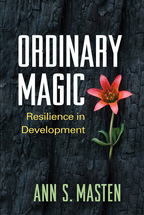Ordinary Magic
Resilience in Development
Ann S. Masten
“For nearly 40 years, Ann Masten has been at the forefront of the ever-changing science of resilience….Masten’s intimate involvement with this research makes her uniquely suited to provide a comprehensive and concise overview of developments in resilience research to date….It is not only Masten’s critical role in resilience research that makes Ordinary Magic a valuable read. Her clear and skillful writing makes the details of this complex field accessible to a broad audience, ranging from resilience scientists to undergraduate psychology majors. Complex matters are explained in simple terms, making them comprehensible to many readers from wide-ranging disciplines. Masten presents an impressive array of the knowledge that she has gained through her years in the field in a clear and concise manner….Ordinary Magic…centers on the innovative assertion that resilience is common and dependent on ordinary adaptive systems internal and external to individuals. Masten has succeeded in writing a book that expands on this core idea in a manner that is broadly accessible and applicable for researchers, professionals, and students alike.”
—Journal of the American Academy of Child and Adolescent Psychiatry
“Sheer joy….All scholars wishing to better acquaint themselves with the resilience in development literature would do well to pick up Masten’s book and read it solicitously….Applicable for scientists, practitioners, family members, teachers, early interventionists, policymakers, and countless others who genuinely strive for equity and equanimity among all—especially the vulnerable.”
—Infant Mental Health Journal
“I do so wish that this book had been available before I did my doctorate in resilience studies and when I had been teaching this subject….I continue to be very grateful for resilience research and theorizing as a practitioner and, in particular, for this unique summary and stock take of the discipline that Professor Ann Masten provides. Ordinary Magic will be of very great assistance to postgraduate students, and to beginning researchers, because it details the waves of resilience investigations that have brought us to the present day….In my teaching experience, even postgraduate students can have trouble really understanding the resilience perspective, and they will surely benefit from Masten’s commitment to expressing complex ideas in straightforward language.”
—Psychology Aotearoa
“Masten's book deserves reading because of its extraordinary synthesis of selected theories and research….Masten has pulled together the wide range of approaches to the concept and its empirical grounding to this date. This has been a difficult task but the result is essentially a truly new 'manual on resilience,' which will last as a guide to further research for at least the next decade.”
—PsycCRITIQUES
“Ann Masten writes in an accessible narrative style while drawing on her vast personal and professional experience as a professor and international resilience expert….An illuminating and useful text for students, researchers, and anyone interested in this field.”
—Therapy Today
“Recommended. Upper-division undergraduates through faculty and professionals.”
—Choice Reviews
.
Table of Contents
I. Introduction and Conceptual Overview1. Introduction
2. Models of Resilience
II. Studies of Individual Resilience
3. Resilience in a Community Sample: The Project Competence Longitudinal Study
4. Overcoming Disadvantage and Economic Crisis: Homeless Children
5. Mass Trauma and Extreme Adversities: Resilience in War, Terrorism, and Disaster
III. Adaptive Systems in Resilience
6. The Short List and Implicated Protective Systems
7. The Neurobiology of Resilience
8. Resilience in the Context of Families
9. Resilience in the Context of Schools
10. Resilience in the Context of Culture
IV. Moving Forward: Implications for Action and Future Research
11. A Resilience Framework for Action
12. Conclusions and Future Directions
Appendix A. Glossary
Appendix B. Abbreviations
Appendix C. Recommended Readings by Topic
